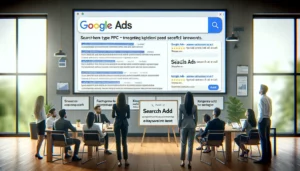Is PPC the same as paid ads? Understanding the Difference

In the realm of digital marketing, understanding the nuances between PPC (Pay-Per-Click) and paid ads is crucial for crafting effective advertising strategies. While the terms are often used interchangeably, they encompass different advertising models and platforms. This article aims to demystify these concepts, explore their mechanics, and highlight the key differences and benefits to help you make informed decisions.
Key Takeaways
- PPC (Pay-Per-Click) and paid ads are often used interchangeably but refer to different advertising models.
- PPC ads can appear on search engines, social media platforms, and display networks.
- Paid search is a subset of PPC focused specifically on search engine result pages (SERPs).
- Both PPC and paid ads offer targeted advertising, cost-effectiveness, and measurable results.
- Understanding the mechanics and types of PPC ads can help in creating successful advertising campaigns.
Is PPC the same as paid ads? Defining PPC and Paid Ads
Understanding PPC
PPC, or Pay-Per-Click, is an online advertising model where advertisers pay a fee each time their ad is clicked. Essentially, it’s a way of buying visits to your site, rather than attempting to “earn” those visits organically. PPC ads can appear in search engine results, on social media platforms, and on various websites. The main idea behind PPC is to drive targeted traffic to a website by bidding on relevant keywords and creating compelling ad campaigns. This makes it a cost-effective advertising method, as you only pay when someone engages with your ad.
What Constitutes Paid Ads?
Paid advertising is a broader term that encompasses various online ad formats, including PPC. It targets consumers using different formats like search ads, social ads, and display ads, based on their interests or intent. Since it allows you to target a specific audience group, you have a higher chance of generating qualified leads and conversions. Paid ads can be found on search engines, social media platforms, and other websites, making it a versatile option for reaching potential customers.
Common Misconceptions (Is PPC the same as paid ads? )
One common misconception is that PPC and paid search are the same. While it’s true that almost all paid search ads are PPC ads, not all PPC ads are paid search ads. PPC ads can also appear on social media and in display advertising, such as ad banners on news websites. Another misconception is that PPC is expensive. In reality, it can be very cost-effective, especially when you consider the potential for high returns on investment.
Remember: almost all paid search ads are PPC ads, but not all PPC ads are paid search ads.
Is PPC the same as paid ads? The Mechanics of PPC Advertising
How PPC Works
PPC advertising works by allowing advertisers to bid on specific keywords or phrases that they want their ads to appear for in search engine results. When a user searches for one of those keywords or phrases, the advertiser’s ad will appear among the top results. The advertiser is then charged a fee each time a user clicks on their ad. This model ensures that you only pay for actual engagement, making it a cost-effective strategy for driving targeted traffic to your website.
Cost-Per-Click (CPC) Explained
Cost-Per-Click (CPC) is a crucial metric in PPC advertising. It represents the amount you pay each time someone clicks on your ad. The CPC can vary based on the competitiveness of the keyword, the quality of your ad, and your bidding strategy. A lower CPC means you can get more clicks within your budget, making your campaign more efficient. Regularly conducting a PPC audit can help you optimise your CPC and overall campaign performance.
Bidding Strategies
Effective bidding strategies are essential for a successful PPC campaign. There are several types of bidding strategies you can employ:
- Manual Bidding: You set the maximum CPC for your ads.
- Automated Bidding: The platform adjusts your bids to maximise clicks or conversions within your budget.
- Target CPA (Cost-Per-Acquisition): You set a target cost for each conversion, and the platform optimises your bids to achieve this.
- Target ROAS (Return on Ad Spend): You set a target return on ad spend, and the platform adjusts your bids to meet this goal.
Choosing the right bidding strategy depends on your campaign goals and budget. Consulting with a PPC agency or conducting a thorough PPC audit can provide valuable insights into which strategy will work best for you.
Partnering with a London PPC agency can offer you tailored strategies and expert insights, ensuring your campaigns are both effective and efficient.
By understanding these mechanics, you can better manage your PPC campaigns and achieve your advertising goals. Whether you’re working with a PPC ad agency or handling PPC management in-house, these principles are fundamental to your success.
Is PPC the same as paid ads? Different Types of PPC Ads
Search Ads
Search Ads are the most common type of PPC and refer to the text ads that show up on search engine results pages. These ads are triggered by specific keywords that users type into search engines. They are highly effective for capturing user intent because they appear when someone is actively searching for information related to your product or service. To maximize the effectiveness of Search Ads, conducting a thorough Google ads audit is essential.
Display Ads
Display Ads allow you to place ads, usually image-based, on external websites, including social media platforms. These ads can be bought through networks like the Google Display Network (GDN) or other ad networks. Display Ads are excellent for brand awareness and retargeting campaigns. They can be visually engaging and are often used to keep your brand top-of-mind for potential customers.
Social Media Ads
Social Media Ads are a powerful way to reach your audience on platforms like Facebook, Instagram, and LinkedIn. These ads can be highly targeted based on user demographics, interests, and behaviours. Social Media Ads offer various formats, including image, video, carousel, and slideshow ads. They are particularly effective for engaging users and driving conversions through social interactions.
When planning your PPC strategy, it’s crucial to understand the different types of ads available and how they can be leveraged to meet your business goals. Each type of PPC ad has its unique advantages and can be used in different stages of the customer journey.
Paid Search vs. PPC: Key Differences
Paid Search Overview
Paid Search is a term used to describe all paid advertising channels on search engines like Google, Bing, and others. These ads appear on Search Engine Results Pages (SERPs) and are designed to capture the attention of users actively searching for specific keywords. Paid search encompasses various ad formats, including text ads, shopping ads, and even video ads. The primary goal is to drive traffic to your website by appearing at the top of search results.
PPC Overview
Pay-Per-Click (PPC) is a method of paid online advertising where businesses only pay for an ad placement after it is clicked on. These ads can appear on search engines, social media platforms, and other websites. PPC is a highly targeted form of advertising that allows you to reach potential customers based on specific criteria such as keywords, demographics, and interests. The cost of PPC campaigns can vary depending on the competitiveness of the keywords and the bidding strategies employed.
Comparing the Two (Is PPC the same as paid ads? )
While Paid Search and PPC are often used interchangeably, they are not the same. Paid Search is a broader term that includes all types of ads on search engines, whereas PPC is a specific model within paid search where you pay only when someone clicks on your ad. Here are some key differences:
- Scope: Paid Search includes all ad formats on search engines, while PPC is a payment model.
- Cost Structure: In PPC, you pay per click, whereas Paid Search can include other models like Cost-Per-Thousand Impressions (CPM).
- Platforms: Paid Search is limited to search engines, but PPC can be used on various platforms including social media and display networks.
Understanding these differences can help you better allocate your advertising budget and optimise your campaigns for maximum ROI.
Is PPC the same as paid ads? Benefits of PPC and Paid Ads
Targeted Advertising
One of the most significant benefits of PPC and paid ads is the ability to target your ideal customers. With platforms like Google Ads PPC and social media networks, you can define your audience based on demographics, interests, and even behaviours. This ensures that your ads are shown to people who are more likely to be interested in your products or services, increasing the chances of generating qualified leads and conversions.
Cost-Effectiveness
PPC ads are incredibly cost-effective. You have complete control over your budget and only pay when someone clicks on your ad. This pay-per-click model ensures that you get your money’s worth, especially when your ads are well-targeted. With Google Adwords PPC, you can set daily or monthly budgets, making it easier to manage your advertising spend.
Measurable Results
One of the standout features of PPC and paid ads is the ability to measure results accurately. Platforms like Google Ads provide detailed analytics that show how your ads are performing. You can track metrics such as clicks, impressions, and conversions, allowing you to make data-driven decisions. This is particularly beneficial for eCommerce PPC campaigns, where understanding customer behaviour is crucial for optimising ad performance.
The ability to measure and analyse your PPC campaigns in real-time allows for continuous improvement, ensuring that your advertising efforts are always aligned with your business goals.
Is PPC the same as paid ads? Creating a Successful PPC Campaign
Creating a successful PPC campaign involves several critical steps that ensure your ads reach the right audience and generate the desired results. Here’s a breakdown of the essential components:
Keyword Research
Keyword research is the foundation of any PPC campaign. You need to identify the most relevant keywords that your target audience is searching for. Use tools like Google Keyword Planner to find keywords with high search volume and low competition. Long-tail keywords can be particularly effective as they often have lower competition and higher conversion rates.
Ad Creation
Crafting compelling ads is crucial for capturing your audience’s attention. Keep your copy concise and focused, and always include a compelling call to action. Incorporate dynamic elements like videos to elevate engagement. For display ad campaigns, use visually captivating images to grab attention and incorporate storytelling to engage viewers and convey your message effectively.
Performance Tracking
Once your campaign is live, it’s essential to monitor its performance closely. Pay attention to metrics like click-through rate (CTR), conversion rate, and cost-per-click (CPC). By paying close attention to each of these metrics, you can increase the ROI of your paid campaign and spend less for better results. Use A/B testing to identify which ads perform best and scale those until they no longer produce desirable results.
Applying the lessons found in this guide about building a PPC campaign, the best practices for a quality PPC strategy, and the tips found in The Ultimate Google Ads PPC Kit will set you well on your way to improving your website’s traffic and conversions.
Is PPC the same as paid ads? Common Platforms for PPC Advertising
Google Ads
Google Ads is arguably the most popular PPC platform. It allows you to display ads on Google’s search engine results pages (SERPs), YouTube, and other partner sites. Google Ads agencies can help you optimise your campaigns for better performance. The platform uses a bidding system where advertisers bid on keywords relevant to their business. The highest bidder gets the top ad spot, but the quality and relevance of the ad also play a crucial role.
Facebook Ads
Facebook Ads offer a robust PPC solution, allowing you to target users based on their interests, behaviours, and demographics. This platform is particularly effective for visual and video ads, making it a favourite for eCommerce businesses. Facebook’s advanced targeting options enable you to reach a highly specific audience, which can significantly improve your ROI.
YouTube Ads
YouTube Ads, managed through Google Ads, provide an excellent opportunity for video advertising. These ads can appear before, during, or after YouTube videos, and can be targeted based on user behaviour and video content. A PPC eCommerce agency can help you create compelling video ads that capture attention and drive conversions.
Leveraging multiple PPC platforms can maximise your reach and improve your overall advertising effectiveness. Each platform has its unique strengths, so consider your business goals and target audience when choosing where to invest your ad spend.
Conclusion
In conclusion, while PPC (Pay-Per-Click) and paid ads are often used interchangeably, they are not exactly the same. PPC is a specific model of online advertising where advertisers pay only when their ad is clicked, making it a cost-effective method to drive targeted traffic. Paid ads, on the other hand, encompass a broader range of advertising formats, including social media ads, display ads, and more. Understanding the nuances between PPC and paid ads can help businesses better strategise their marketing efforts and optimise their advertising budgets. By leveraging the strengths of both PPC and other paid advertising formats, companies can effectively reach their target audiences and achieve their marketing goals.
Frequently Asked Questions
Is PPC the same as paid ads?
Not exactly. While PPC (Pay-Per-Click) is a type of paid advertising, it specifically refers to ads where the advertiser pays only when someone clicks on the ad. Paid ads encompass a broader range of advertising models, including PPC, CPM (Cost-Per-Thousand Impressions), and CPA (Cost-Per-Acquisition).
What does a paid search ad look like?
Paid search ads typically appear at the top or bottom of search engine results pages (SERPs). They are usually marked with a small ‘Ad’ label and are triggered by specific keywords that users search for.
Are paid search and PPC the same thing?
They are similar and often used interchangeably. Paid search refers to all ads that appear on search engine results pages, while PPC is a model within paid search where advertisers pay only when someone clicks on the ad.
What is paid search?
Paid search refers to advertisements that appear on search engine results pages (SERPs) like Google, Bing, and others. These ads are usually triggered by specific keywords that users search for.
What are the main types of PPC ads?
The main types of PPC ads include search ads, display ads, and social media ads. Search ads appear on search engine results pages, display ads appear on websites, and social media ads appear on platforms like Facebook and Instagram.
What is Cost-Per-Click (CPC)?
Cost-Per-Click (CPC) is the amount that an advertiser pays for each click on their ad. It acts as a bid in an auction that determines the placement of the ad. Higher bids usually result in better ad placements.
Author
Search Blog
Free PPC Audit
Subscribe to our Newsletter
The Voices of Our Success: Your Words, Our Pride
Don't just take our word for it. With over 100+ five-star reviews, we let our work-and our satisfied clients-speak for us.
"We have been working with PPC Geeks for around 6 months and have found Mark and the team to be very impressive. Having worked with a few companies in this and similar sectors, I rate PPC Geeks as the strongest I have come across. They have taken time to understand our business, our market and competitors and supported us to devise a strategy to generate business. I value the expertise Mark and his team provide and trust them to make the best recommendations for the long-term."
~ Just Go, Alasdair Anderson




